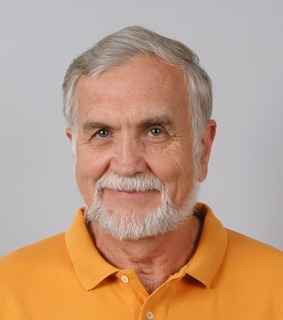
Geoffrey Alan Landis is an American aerospace engineer and author, working for the National Aeronautics and Space Administration (NASA) on planetary exploration, interstellar propulsion, solar power and photovoltaics. He holds nine patents, primarily in the field of improvements to solar cells and photovoltaic devices and has given presentations and commentary on the possibilities for interstellar travel and construction of bases on the Moon, Mars, and Venus.

The Discovery Program is a series of Solar System exploration missions funded by the US National Aeronautics and Space Administration (NASA) through its Planetary Missions Program Office. The cost of each mission is capped, at a lower level than a mission from NASA's New Frontiers or Flagship Programs. As a result, Discovery missions tend to be more focused on a specific scientific goal.

Steven Weldon Squyres is the James A. Weeks Professor of Physical Sciences at Cornell University in Ithaca, New York. His research area is in planetary sciences, with a focus on large solid bodies in the Solar System such as the terrestrial planets and the moons of the Jovian planets. Squyres was the principal investigator of the Mars Exploration Rover Mission (MER). He is the recipient of the 2004 Carl Sagan Memorial Award and the 2009 Carl Sagan Medal for Excellence in Communication in Planetary Science. Squyres also received the 2010 Mines Medal for his achievements as a researcher and professor. He is the brother of Academy Award-nominated film editor Tim Squyres.
Wesley T. Huntress, Jr. is an American space scientist. An astrochemist and space scientist, Huntress worked for about twenty years at NASA's Jet Propulsion Laboratory. During the 1980s he was also a video game designer, producing games for Apple computers. In 1988 Huntress moved to NASA headquarters, where he would serve in several positions, including Director of NASA's Solar System Exploration Division and Associate Administrator for Space Science.
The Lunar and Planetary Institute (LPI) is a scientific research institute dedicated to study of the solar system, its formation, evolution, and current state. The Institute is part of the Universities Space Research Association (USRA) and is supported by the Science Mission Directorate of the National Aeronautics and Space Administration (NASA). Located at 3600 Bay Area Boulevard in Houston, Texas, the LPI maintains an extensive collection of lunar and planetary data, carries out education and public outreach programs, and offers meeting coordination and publishing services. The LPI sponsors and organizes several workshops and conferences throughout the year, including the Lunar and Planetary Science Conference (LPSC) held in March in the Houston area.

Sol Alan Stern is an American engineer and planetary scientist. He is the principal investigator of the New Horizons mission to Pluto and the Chief Scientist at Moon Express.
The New Frontiers program is a series of space exploration missions being conducted by NASA with the purpose of furthering the understanding of the Solar System. The program selects medium-class missions which can provide high science returns.

Maria T. Zuber is an American astronomer who is a member of the National Science Board and the Vice President for Research at the Massachusetts Institute of Technology, where she also holds the position of the E. A. Griswold Professor of Geophysics in the Department of Earth, Atmospheric and Planetary Sciences. Zuber has been involved in more than half a dozen NASA planetary missions aimed at mapping the Moon, Mars, Mercury, and several asteroids. She is currently the principal investigator for the Gravity Recovery and Interior Laboratory (GRAIL) Mission, which is managed by NASA's Jet Propulsion Laboratory.

James (Jim) F. Bell III is a Professor of Astronomy at Arizona State University, specializing in the study of planetary geology, geochemistry and mineralogy using data obtained from telescopes and from various spacecraft missions. Dr. Bell's active research has involved the NASA Mars Pathfinder, Near Earth Asteroid Rendezvous (NEAR), Comet Nucleus Tour (CONTOUR), 2001 Mars Odyssey, Mars Reconnaissance Orbiter, Lunar Reconnaissance Orbiter, and the Mars Science Laboratory missions. His book Postcards from Mars includes many images taken by the Mars rovers. Dr. Bell is currently an editor of the space science journal Icarus and president of The Planetary Society. He has served as the lead scientist in charge of the Panoramic camera (Pancam) color imaging system on Mars rovers Spirit and Opportunity.
The NASA Decadal Planning Team (DPT) and its successor, the NASA Exploration Team (NExT), were influential behind-the-scenes efforts to develop a major new direction for the space agency early in the 21st Century.

Linda A. Morabito, also known as Linda Kelly, Linda Hyder, and Linda Morabito-Meyer, is the astronomer who discovered volcanic activity on Io, a moon of Jupiter. She made this finding on March 9, 1979, at NASA's Jet Propulsion Laboratory. At the time of her discovery, she was serving as Cognizant Engineer over the Optical Navigation Image Processing System (ONIPS) on the Voyager deep space mission Navigation Team. While performing image processing analysis of a Voyager 1 picture taken for spacecraft navigation, she detected a 270 kilometres (170 mi) tall cloud off the limb of Io. The cloud was of volcanic origin. This was the first time in history that active volcanism was detected off of Earth. Her discovery is considered by some planetary scientists as the largest discovery of the planetary exploration program that has come out of Jet Propulsion Laboratory. Morabito is currently an associate professor of astronomy at Victor Valley College. Linda Morabito Meyer is also the author of a memoir, Parallel Universes, a Memoir from the Edges of Space and Time.

Mars Exploration Program (MEP) is a long-term effort to explore the planet Mars, funded and led by NASA. Formed in 1993, MEP has made use of orbital spacecraft, landers, and Mars rovers to explore the possibilities of life on Mars, as well as the planet's climate and natural resources. The program is managed by NASA's Science Mission Directorate by Doug McCuistion of the Planetary Science Division. As a result of 40% cuts to NASA's budget for fiscal year 2013, the Mars Program Planning Group (MPPG) was formed to help reformulate the MEP, bringing together leaders of NASA's technology, science, human operations, and science missions.

Ronald Greeley was a Regents’ Professor in the School of Earth and Space Exploration (SESE) at Arizona State University (ASU), the Director of the NASA-ASU Regional Planetary Image Facility (RPIF), and Principal Investigator of the Planetary Aeolian Laboratory at NASA-Ames Research Center. He was involved with lunar and planetary studies since 1967 and most recently focused his research on understanding planetary surface processes and geologic histories.

G. Scott Hubbard is a physicist who has been engaged in space-related research as well as program, project and executive management for more than 45 years including 20 years with NASA, culminating as director of NASA's Ames Research Center. As of 2012, Hubbard chairs SpaceX Safety Advisory Panel, he previously served as the NASA representative on the Columbia Accident Investigation Board, was NASA's first Mars program director and restructured the Mars program in the wake of mission failures.

Ellen Renee Stofan is the John and Adrienne Mars Director of the National Air and Space Museum. She is the first female Director of the museum, and began her tenure in April, 2018.

Adriana C. Ocampo Uria is a Colombian planetary geologist and a Science Program Manager at NASA Headquarters. In 1970, Ocampo emigrated to California and completed her Master in Sciences at California State University, Northridge and finished her PhD at the Vrije Universiteit in the Netherlands. During high school and graduate studies she worked that the Jet Propulsion Laboratory, where she serves as the science coordinator for many planetary missions.

VERITAS is an upcoming mission from NASA's Jet Propulsion Laboratory (JPL) to map the surface of planet Venus in high resolution. The combination of topography, near-infrared spectroscopy, and radar image data will provide knowledge of Venus's tectonic and impact history, gravity, geochemistry, the timing and mechanisms of volcanic resurfacing, and the mantle processes responsible for them.

DAVINCI+ is a planned mission for an atmospheric probe to the planet Venus. Together with the VERITAS mission, which will also study Venus, it was selected by NASA on 2 June 2021 to be part of their Discovery Program.

The Planetary Missions Program Office is a division of NASA headquartered at the Marshall Space Flight Center, formed by the agency's Science Mission Directorate (SMD). Succeeding the Discovery and New Frontiers Program Office, it was established in 2014 to manage the Discovery and New Frontiers programs of low and medium-cost missions by third-party institutions, and the Solar System Exploration program of NASA-led missions that focus on prioritized planetary science objectives. The Discovery and New Frontiers programs were established in 1992 and 2001 respectively, and have launched fourteen primary missions together, along with two missions launched under the administration of the Planetary Missions Program Office. The Solar System Exploration Program was established alongside the office, with three missions planned for launch under the new program.

Joel S. Levine is an American planetary scientist, author, and research professor in applied science at the College of William & Mary, specializing in the atmospheres of Earth and Mars. He has worked as a senior research scientist at NASA, developing scientific models of the evolution of the Earth’s early atmosphere, as well as creating models of the Martian atmosphere for use during the Viking 1 and 2 Mars Orbiter and Lander Missions, and was principal investigator and chief scientist of the proposed ARES Mars Airplane Mission. He also formed and led the "Charters of Freedom Research Team," a group of 12 NASA scientists who worked with the National Archive and Records Administration (NARA) to preserve the United States Declaration of Independence, the Constitution, and the Bill of Rights when small white spots began appearing on the documents in 1988. Levine's past work also includes assisting in the design of the rescue vehicle that saved 33 Chilean miners in the 2010 Copiapó mining accident, as well as original research on the feasibility of the "nuclear winter" hypothesis, and the effects of uncontrolled fires on global warming.















